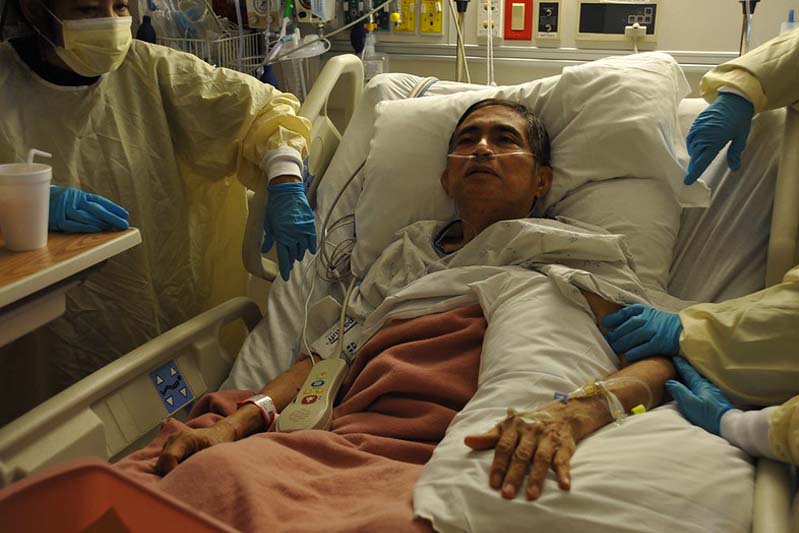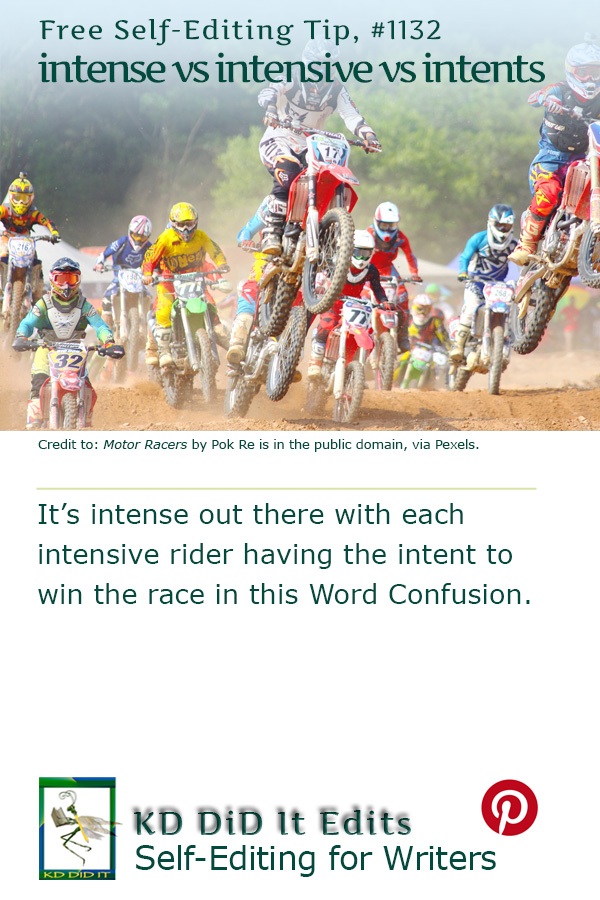My intent in this word confusion is an intense look in intensive detail at intense vs intensive vs intent.
To be intense is subjective — about emotions — and extremely earnest or serious.
To be intensive is about objective description and is extremely focused on a single area or subject or for a short time.
To be intent is about one’s purpose, determined to do something.
George was intent on taking this course and intense about the subject matter even though it was an intensive course.
Word Confusions . . .
. . . started as my way of dealing with a professional frustration with properly spelled words that were out of context in manuscripts I was editing as well as books I was reviewing. It evolved into a sharing of information with y’all. I’m hoping you’ll share with us words that have been a bête noire for you from either end.
If you found this post on “Intense vs Intensive vs Intent” interesting, consider subscribing to KD Did It, if you’d like to track this post for future updates.
| Intense | Intensive | Intent |
|---|---|---|

Intense by Alex Proimos is under the CC BY 2.0 license, via Wikimedia Commons. |

Intensive Care by Emilio Labrador is under the CC BY 2.0 license, via Flickr. |

Intent is in the public domain, via PxHere. |
| Part of Grammar: | ||
| Adjective | Adjective; Noun
Plural for the noun: intensives |
Adjective; Noun
Plural for the noun: intents |
Of extreme force, degree, or strength
Having or showing strong feelings or opinions
|
Adjective: Concentrated on a single area or subject or into a short time
[Grammar; of an adjective, adverb, or particle] Expressing intensity
[Mainly Physics] Denoting a property which is measured in terms of intensity, e.g., concentration, rather than of extent, e.g., volume, and so is not simply increased by addition of one thing to another Noun:
|
Adjective: [Predic.; intent on/upon] Resolved or determined to do (something)
[Especially of a look] Showing earnest and eager attention Noun: |
| Examples: | ||
| The job demands intense concentration.
The heat was intense. She used an intense blue on the walls. We’ll go through a phase of intense activity. She an intense young woman, passionate about her art. He intercepted a burning and intense look. |
Adjective: She undertook an intensive Arabic course. It was eight days of intensive arms talks. They were exploring intensive farming techniques. It used computer-intensive methods. They psyched themselves up for the football game. Freddie himself asked Julie out. That is a good idea! Those are my friends. “Examples of intensive properties include temperature, T; refractive index, n; density, ρ; and hardness, η” (Intensive). Noun: Are you completely insane? That’s too utterly funny. |
Adjective: The administration was intent on achieving greater efficiency. Jill was intent on her gardening magazine. Paul noticed a curiously intent look on her face. Noun: The government had a real intent to cut back on social programs. He was a man who was to all intents and purposes illiterate. |
| Derivatives: | ||
| Adjective: intenser, intensest Adverb: intensely Noun: intenseness |
Noun: intensiveness | Adjective: intentional, intentioned Adverb: intentionality, intentionally, intently Noun: intention, intentionalism, intentness |
| History of the Word: | ||
| Late Middle English from the Old French or from the Latin intensus meaning stretched tightly, strained, past participle of intendere. | Late Middle English, in the sense vehement, intense, is from the French intensif, -ive or the medieval Latin intensivus, from intendere. | Middle English from the Old French entent, entente, based on the Latin intendere.
The adjective is from the Latin intentus, a past participle of intendere. |
C’mon, get it out of your system, bitch, whine, moan . . . which words are your pet peeves? Also, please note that I try to be as accurate as I can, but mistakes happen or I miss something. Email me if you find errors, so I can fix them . . . and we’ll all benefit!
Satisfy your curiosity about other Word Confusions on its homepage or more generally explore the index of self-editing posts. You may also want to explore Book Layout & Formatting Ideas, Formatting Tips, Grammar Explanations, Linguistics, Publishing Tips, the Properly Punctuated, Writing Ideas and Resources, and Working Your Website.
Resources for Intense vs Intensive vs Intent
Apple Dictionary.com
Handbook of Definitions and Rules. Glencoe/McGraw-Hill. <https://www.nlsd.k12.oh.us/userfiles/63/Classes/4521/12%20grade%20grammar%20-%20student%20edition1.pdf>.
“Intensive and Extensive Properties.” Wikipedia. 23 Oct 2022. Web. 30 Nov 2022. <https://en.wikipedia.org/wiki/Intensive_and_extensive_properties>.
Pinterest Photo Credits:
Motor Racers by Pok Re is in the public domain, via Pexels.


